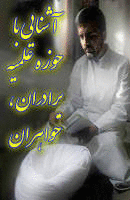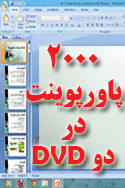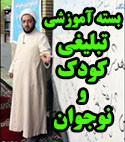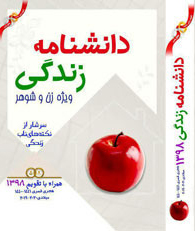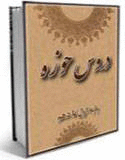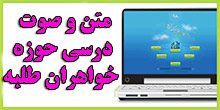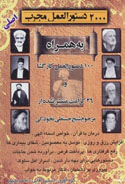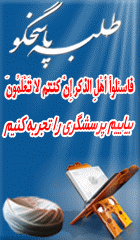Hazrat Zainab's(s.a) Marriage
Hazrat Zainab's(s.a) Marriage
When the time came for marriage, she was married in a simple ceremony to her first cousin, Abdullah Ibn Ja'far Tayyar. Her marriage settlement was equal to that of her mother's. Imam Ali (a.s.) told Ja'far not to prevent Zainab from going on a journey with Imam Hussain (a.s.), her brother.
Abdullah had been brought up under the direct care of the Prophet (SAW). After his death, Imam Ali (a.s.) became his supporter and guardian until he came of age. He grew up to be a handsome youth with pleasing manners and was known for his sincere hospitality to guests and selfless generosity to the poor and needy.
Although Zainab's husband was a man of means, she lived a modest life, not a life of luxury. She and her husband were charitable to the needy people. The Arab tribes called Abdullah "the sea or the cloud of munificence".
The marriage of Zainab did not diminish her strong attachment to her family. Together this young couple had five children, of whom four were sons, Ali, Aun, Muhammad, and Abbas, and one daughter, Umm Kulthum.
In Medina it was Zainab's practice to hold regular meetings for women in which she shared her knowledge and taught them the precepts of the Deen of Islam as laid out in the Holy Quran. Her gatherings were well and regularly attended. She was able to impart the teachings with such clarity and eloquence that she became known as Fasihah (skillfully fluent) and Balighah (intensely eloquent).
In the thirty-seventh year A.H. (after Hijrah), Imam Ali (as) moved to Kufa to finally take up his rightful position as khalifah. He was accompanied by his daughter Zainab (s.a.) and her husband. Her reputation as an inspiring teacher among the women had preceded her. There too women would throng to her daily sittings where they all benefited from her erudition, wisdom and scholarship in the exegesis of the Qur'an.
The depth and certainty of her knowledge earned her the name given to her by her nephew, Imam Ali Zayn ul-Abidin (a.s.), of Alimah Ghayr Mu'allamah, 'she who has knowledge without being taught'.
reference:ziaraat.org
مطالب مشابه با این موضوع:
وبگــــــــــردی طلبۀ پاسخگو
- فایل اعمال و رفتار های خلاف قانون جناب آقای حسن روحانی
- در کنج خانه طلبهها چه میگذرد؟
- سکوت چند ساله مسئولان حوزه در قبال حملات وحشیانه به طلاب!
- می گویند که مملکت مملکت آخوندهاست!!
- یک ماجرای تلخ که خانم ها با تأمل بیشتر بخونند
- جریان های تکفیری موجود در عراق و نحوه شکل گیری آنها
- سیر تکاملی تفکر سلفیه چگونه بوده است؟
- بداء در قرآن و حدیث چگونه مطرح شده است؟
- پیامبر (ص) با مخالفین خود چگونه بر خورد می کرد؟
- سبک زندگی حضرت زهرا سلام الله علیها
- ملاک کرامت و شرافت افراد، انسانیت است یا جنسیت؟
- رنگ و پوشش های رنگی در اسلام
- حجاب، زنان را افسرده میکند و مانع پیشرفت اجتماعی آنهاست!!!
- علوم لدنی معصومین
- مگر ولی فقیه معصوم است که ولایت مطلقه دارد؟
- اگر خدا ازعاقبت ما اطلاع دارد قیامت برای چیست؟
- آیا بجای نماز خوندن، پیانو یا سه تار بزنم؟
- چرا مراسم عزاداري امام حسين(ع) پيش از شهادت ايشان صورت ميگيرد؟
- چرا امام حسين(ع) در كربلا براي رفع تشنگي از خداوند طلب باران نكرد؟
دانــــــلود های مفیـــــــــــــــــــد
- دانلود پاورپوینت شناخت وهابیت و صهیونیسم و ارتباط با همدیگر
- دانلود دو پاورپوینت اجرای عید غدیر خم
- دانلود پاورپوینت احتجاج اميرمؤمنان (ع) به غدير
- پژوهشی در کلام و پیام مقام معظم رهبری پیرامون ماه رمضان
- خطبه شعبانیه و خطبه امیرالمومنین(علیه السلام) پیرامون روزه و ماه رمضان
- دانلود پاورپوینت و pdf تفاوت های زن و مرد
- دانلود جزوه ساعات سعد و نحس(زمان نوشتن دعا)
- تقویم مذهبی شمیم یار 96 مخصوص کامپیوتر
- دانلود نرم افزار «شیعه شناسی»
- دانلود پاورپوینت ساختار خانواده و مسایل آن
- دانلود کتاب دایره المعارف جنسی
- دانلود نکات جذاب دوران عقد
- دانلود کتاب درمان سرد مزاجی و بی میلی جنسی بانوان
- دانلود کتاب حسادت کودکان
- دانلود کتاب درمان خستگی وناتوانی جنسی
- دانلود پاور پوینت اسیب های ازدواج وخانواده
- دانلود پاورپوینت هشت گام برای تحقق رویا به واقعیت
- دانلود پاورپوینت تقویت اراده
- دانلود پاورپوینت موفقیت وروشهای رسیدن به ان
- دانلود پاورپوینت هنر رفتار با افراد دشوار
- دانلود پاورپوینت جملات جالب وجذاب روحیه بخش بزرگان
- دانلود پاورپوینت راههای مقابله ودرمان استرس
- دانلود پاورپوینت نیازهای اساسی کودکان
منبــــرهای مکــــــــــــــــــتوب
- منبر مکتوب: روز عرفه و فرصت ها
- منبر مکتوب: سبک زندگی امام باقر علیه السلام
- منبر مکتوب: سه نیاز مومن (امام جواد علیه السلام)
- سخنرانی سلسله ای و چند جلسه ای مناسبت ماه رمضان
- دانلود 30 جلسه سخنرانی ماه مبارک با موضوع تنها مسیر
- موضوعات پیشنهادی سخنرانی برای محرم
- فضائل حضرت قمر بنی هاشم علیه السلام
- برکات وجود ابا عبدالله علیه السلام بر عالم
- بررسی بُعد اخلاقی،عبادی و عرفانی عاشورا
- آخرين وصيت امام حسين عليه السلام
- اولین علت رویاروی در کربلا؛ دوری از یاد خدا
- هميشه حزن؟ شادي چرا نه؟ - شب دهم محرم
- چرا نفرين ؟ - شب نهم محرم
- نماز ظهر عاشورا - شب هشتم محرم
- فلسفه عزاداری - شب هفتم محرم
- دفاع از دین - شب ششم محرم
- فلسفه حضور خانواده سيد الشهداء - شب پنجم محرم
- علم امام علیه السلام به شهادت - شب چهارم محرم
- فقدان شرایط امر به معروف و نهی از منکر- شب سوم محرم
مناظرات طلبه پاسخگو
جدیدترین های زبان انگلیسی
- Islam and Its Social System
- Duties of Man Towards the People
- Islam Various Systems
- Attributes of The Real Follower of Imams in Their Teachings
- Who is a Real Shia Muslim?
- RIGHTS OF SCHOLARS
- Islam Attacks Slavery 1
- The Advantages of Religion 2
- The Clearest Reason for Free Will
- Sheikh Zakzaky to be released on bail
- Brief History of Religions
- Is It Necessary For Man To Follow A Religion?
- The Advantages of Religion 1
- Who Is Almighty Allah?
- What are the differences between Shia and Sunni Muslims؟
- The Rights Islam Offers to Women
- How I find that Islam does not Oppress Women?
- URGENT MEDICAL TREATMENT FOR SHEIKH ZAKZAKY
- The motto of this year’s book fair is “Reading Is Ability”.
- Fundamental principles of Islam
بیشترین دانلود ها
- دانلود صوتي تکنیک های نزدیکی زن و شوهر (106477)
- دانلود رایگان کتاب خواص سوره های قرآن (51532)
- دانلود پاورپوینت بسیار مفید مهارت های زندگی (34854)
- دانلود كتاب مسائل جنسي و زناشوئي در احاديث (31740)
- دانلود پاورپوینت و pdf تفاوت های زن و مرد (29609)
- دانلود پاورپوینت های آموزش پیش از ازدواج (28091)
- دانلود کتاب دایره المعارف جنسی (27780)
- دانلود بسیار مفید پاورپوینت آئین همسرداری (27046)
- دانلود پاورپوینت آموزشی بررسی رابطه دختر و پسر (26835)
- دانلود 110جلد کتاب بحارالانوار علامه مجلسی ره (26343)
- دانلود كتاب فرق و مذاهب كلامي استاد رباني گلپايگاني (25997)
- دانلود كتاب دختران خوب به آسمان می روند دختران بد به همه جا (25744)
- دانلود کتاب آموزش جنسی آقایان (25577)
- دانلود کتاب درمان سرد مزاجی و بی میلی جنسی بانوان (24175)
- دانلود نکات جذاب دوران عقد (23323)
- دانلود نرم افزار «شیعه شناسی» (21592)
- دانلود کتاب درمان خستگی وناتوانی جنسی (21553)
- دانلود پاورپوینت تهاجم فرهنگی (20593)
جدیدترین مطالب سایت
- پاسخ به شبهات ولایت (3567) بازدید
- پاسخ به شبهات ولایت (3514) بازدید
- اذان در جامعه اسلامی نماد چیست ؟ و چرا فقط سه بار در روز تکرار می شود ؟ (3227) بازدید
- باتوجه به عادل بودن خداوند چرا بعضی از انسانها را ناقص الخلقه آفریده است ؟ (3212) بازدید
- ویژگی خاص قرآن چیست که کسی نمی تواند مانند آن را بیاورد ؟ (3197) بازدید
- با توجه به ترک خود ارضایی عوارض آن هنوز در من هست چگونه آن را برطرف کنم ؟ (4659) بازدید
- آیا بدن اخروی مانند بدن مادی است ؟چهره ی واقعی انسان در قیامت چگونه است ؟ (3950) بازدید
- آیا ادعای ملاقات امام زمان (عج) از جانب برخی افراد صحت دارد ؟ (3439) بازدید
- چرا به اصول و قواعد دین اسلام توجه نمی شود و پذیرش آن از سوی پیروان ادیان دیگر سخت است ؟ (3795) بازدید
- فلسفه وجود لباس روحانیت در عصر حاضر چیست ؟ (3057) بازدید
- آیا وظیفه یک روحانی تنها راهنمایی مردم و فعالیت و تدریس در حوزه هاست ؟ (2500) بازدید
- آیا نظریه تناسخ از دیدگاه اسلام پذیرفته شده است ؟ (4042) بازدید
- آیا توصیف بهشت و جهنم در قرآن تمثیل هایی برای درک بهتر آن جهان است ؟ (3692) بازدید
- با توجه به اینکه اسلام کاملترین دین هست چرا ما نسبت به کشور های غیر مسلمان عقب مانده تر هستیم ؟ (5413) بازدید
- نقش امام و رهبر در جامعه اسلامی چیست ؟ و اگر نباشد چه اتفاقی می افتد ؟ (3716) بازدید
پربازدیدترین های سایت
- زنی هستم که میخواهم به شوهرم خیانت کنم!!! (603117)
- آيا زن شوهر دار بخاطر رفع نیاز جنسی اش ميتواند صیغه شود؟ (498436)
- دوست دخترم حامله شده چکار کنم؟ (396975)
- میل جنسی زیادی دارم و به شدت داره منو عذاب می ده (337894)
- دیدن فیلم های مبتذل زن و شوهر برای تحریک شدن جنسی (216273)
- چگونه همسرمان را آماده آميزش جنسي كنم؟+18 (211864)
- حکم شرعی نزدیکی از پشت! (206558)
- خانم هایی که می خواهند طلبه شوند بخوانند!!! (203409)
- زنم رابطه جنسی برقرار نمیکند!!! (198118)
- از تجربه های تلخ و تکان دهنده دختران بخوانید شاید... (171308)
- گناه با محارم خود داشتم! (144856)
- رابطه جنسی دهانی حكم چيست؟ (129342)
- محرمات و مکروهات و مستحبات حائض+حکم ورد به امکان مقدسه (128317)
- به رابطه خانمم با خواهر زاده اش مشکوکم؟ (121288)
- سفارش اسلام در مورد آمیزش صحیح چیست؟ (98331)
- نام كتاب حضرت نوح و حضرت ابراهیم؟ (95473)
- با زنان چشم سبز ازدواج نکنیم؟ (92697)











